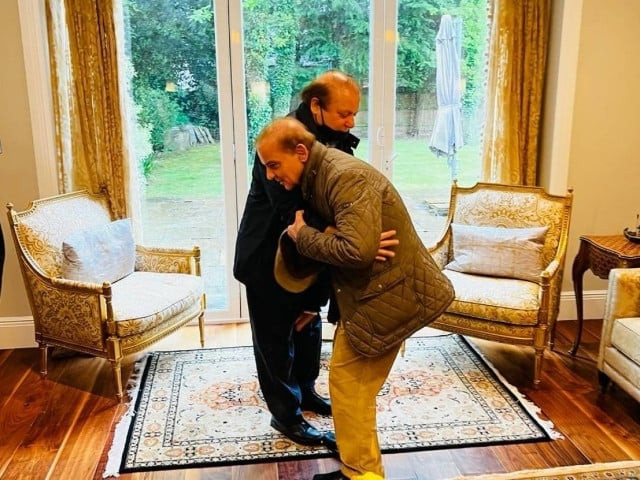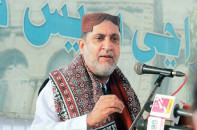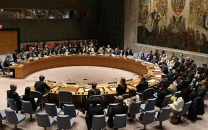Sharifs win 1st Panamagate legal battle
Victory comes after nearly five years

After almost five years, the Sharif family has won its first legal battle in the Panamagate case with the Islamabad High Court on Thursday setting aside the conviction of PML-N Vice President Maryam Nawaz and her husband Captain (retd) Mohammad Safdar in the Avenfield reference.
The Panamagate proceedings were initiated by the Supreme Court on a constitutional petition filed by PTI chairman and deposed prime minister Imran Khan in October 2016.
Imran had sought the disqualification of then premier Nawaz Sharif on account of not disclosing his London properties. According to the PTI chief, Nawaz was the real beneficiary of the London properties.
The Sharif family faced a tough time in the Panamagate case on account of flaws in their legal strategy.
First, Nawaz had defended his purchase of foreign properties in his speeches – an uncalled-for move.
Also read: IHC orders acquittal of Maryam, Captain Safdar in Avenfield case
Secondly, the then PML-N-led government was reluctant to initiate inquiry of this scam using federal agencies including the National Accountability Bureau (NAB), Federal Board of Revenue (FBR), Federal Investigation Agency (FIA), etc. Even then, the government was unwilling to form a powerful commission to probe into the matter.
However, Imran was consistently demanding an inquiry into the purchase of the London apartments.
Finally, a larger bench of the apex court was compelled to take up his petition.
The Sharif family replaced its legal team several times.
The first legal team was led by Salman Aslam Butt, which had presented a Qatari letter before the larger bench in the defence of family.
No objection was raised on the maintainability of Imran's petition.
In the middle of the case proceedings, the Sharif family replaced the legal team by engaging senior lawyers Makhdoom Ali Khan, Salman Akram Raja and Shahid Hamid.
Another Qatari letter as well as a trust dead was presented before the bench, which was not convinced with these documents.
On April 20, 2017, the majority judges had formed a joint investigation team (JIT) to conduct an inquiry into the purchase of Avenfield apartments by the Sharif family.
Interestingly, the Sharif family did not challenge April 20, 2017 judgment, making another mistake.
Senior lawyers agree that the Sharif family faced difficulties on account of Nawaz’s speeches on the Panamagate.
They also believe that producing documentary evidence before the SC to establish how these flats were purchased by the Sharif family was a costly mistake.
The JIT was asked to submit fortnightly reports about its probe to the bench.
On July 10, 2017, the JIT submitted its final report with new revelations related to the business affairs of the Sharif family.
When the JIT started its probe, the Sharif family again changed its legal team.
The first time, Advocate Khawaja Haris was engaged to assist them.
Similarly, a campaign was started against the judiciary on the media, annoying the judges.
The issue related to the employment of Nawaz in his son’s UAE-based company Capital FZE surfaced for the first time in the JIT’s final report.
However, senior lawyers believe that without the assistance of some powerful stakeholders, it was not possible for the JIT to bring the documents related to Capital FZE from the UAE.
In view of these documents, Nawaz was disqualified for lifetime on July 28, 2017.
The court also ordered NAB to file four references against the Sharif family.
It also ruled that an SC judge would monitor the proceedings of the accountability courts, once NAB had filed references in them.
SC’s Justice Ijazul Ahsan was the monitoring judge, who supervised the trials of the PML-N leaders.
However, there are no details on what the parameters were for supervising the trials.
The accountability courts shared the progress report of the trials with the monitoring judge every month.
The Sharif’s legal team consistently expressed reservations over the supervision of the trials by the SC.
Even Khawaja Haris, the counsel for Nawaz, contended in his arguments in the review petition before the five-judge larger bench against the July 20, 2017 verdict that the supervision of the accountability courts’ proceedings would affect fair trials.
The counsel alleged that the SC itself had become the complainant, the prosecutor and the judge in the matter.
In its July 28 verdict, the SC had asked the accountability courts to decide the four references within six months.
However, the accountability courts received eight extensions to complete the trials.
Also read: Maryam had no direct role in buying flats: NAB
Legal experts wondered why an accountability court announced a verdict in one reference — Avenfield case — before the general elections of July 2018. They questioned the manner in which former chief justice of Pakistan Saqib Nisar managed to have the Avenfield case decided before the polls.
Islamabad Accountability Court-I judge passed an order on November 8, 2017, wherein he did not allow Nawaz's application for clubbing all the three references for a joint trial.
When on June 10, 2018, a written request was forwarded by the Islamabad Accountability Court-I to the Supreme Court for an extension of time for the conclusion of trials, the apex court permitted it by way of an unrealistic time of four weeks from the date of the order.
The bench in its order also used the expression “reference/references”. It indicated that if all three references could not be decided together, the accountability court could decide at least one of them within the extended time of four weeks.
Interestingly, the extended period of four weeks ended on July 10, 2018 -- two weeks before the general elelection
One section of lawyers believes that the phrase “reference/references” was subsequently used as an excuse by the accountability court to give a decision in one reference before polls.
In view of the judgment, Nawaz, his daughter Maryam and his son-in-law were convicted and put behind bard before the elections.
After the general elections, the IHC, while suspending the sentence, granted bail to them.
However, the then SC led by ex-CJP Nisar was unhappy on their release. The Sharif family’s legal team decided to prolong the matter in the IHC until the political scenario changed.
The IHC led by its incumbent Chief Justice Athar Minallah while granting bail to them had observed that the conviction against them could not be sustained on the basis of evidence submitted before the accountability court.
Former Gilgit-Balistan chief judge Rana Shamim's affidavit came on surface to rescue the Sharif family in the high court but that strategy could not be effective. Finally, Shamim withdrew his affidavit wherein it was alleged that judicial proceedings were manipulated by ex-CJP Nisar in the Avenfield case.
A senior lawyer, who was associated with the Sharif family, says that there was no case at all against Maryam and her husband.
The lawyer added that trust deeds were considered forged by NAB after receiving the opinion of a so-called expert that Calibri font was not in use when the document was drawn in 2006. However, during cross-examination, he admitted it could be downloaded and used since 2005.
Not only this, the UK attorney who had prepared the trust deed and signed it had confirmed to a NAB investigation officer that it was genuine. However, the NAB investigation officer, despite being in the UK. never had his statement recorded or cited as an accused for his misstatement.
The prosecution relied on some letters from abroad to prove that Maryam was designated as the beneficial owner at some stage.
But neither any record on which this letter was purportedly based was produced nor even the person, who had written it, was cited as a witness.
So it was a case of no evidence as was the case against Nawaz wherein there was no proof against him that he was instrumental in or paid for the purchase of the Avenfield apartments or that there was any document to show that he owned them or had ever corresponded with anyone for their purchase.
Even Wajid Zia, who was the prosecution witness, had admitted all this during his cross-examination.
Senior lawyers believe that it would have been much better if the SC had not monitored the trial proceedings in the Panamagate as it severely affected the reputation of the superior judiciary. There is also a strong perception that the security establishment had influenced the judicial proceedings in Panamagate as was revealed by ex-IHC judge Shaukat Aziz Siddiqui.
Post-Panamagate proceeding, the PML-N showed mistrust in one section of the judiciary. Judges were divided on ideological lines.
It is also a fact that though the case was fragile against Maryam, but her conviction was set aside at a time when the ties between the PML-N leadership and security establishment is not tense.



















COMMENTS
Comments are moderated and generally will be posted if they are on-topic and not abusive.
For more information, please see our Comments FAQ